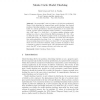Free Online Productivity Tools
i2Speak
i2Symbol
i2OCR
iTex2Img
iWeb2Print
iWeb2Shot
i2Type
iPdf2Split
iPdf2Merge
i2Bopomofo
i2Arabic
i2Style
i2Image
i2PDF
iLatex2Rtf
Sci2ools
109
click to vote
TACAS
2005
Springer
2005
Springer
Monte Carlo Model Checking
We present MC2 , what we believe to be the first randomized, Monte Carlo algorithm for temporal-logic model checking, the classical problem of deciding whether or not a property specified in temporal logic holds of a system specification. Given a specification S of a finite-state system, an LTL (Linear Temporal Logic) formula ϕ, and parameters and δ, MC2 takes N = ln(δ)/ ln(1 − ) random samples (random walks ending in a cycle, i.e lassos) from the B¨uchi automaton B = BS × B¬ϕ to decide if L(B) = ∅. Should a sample reveal an accepting lasso l, MC2 returns false with l as a witness. Otherwise, it returns true and reports that with probability less than δ, pZ < , where pZ is the expectation of an accepting lasso in B. It does so in time O(N · D) and space O(D), where D is B’s recurrence diameter, using a number of samples N that is optimal to within a constant factor. Our experimental results demonstrate that MC2 is fast, memory-efficient, and scales very well.
Related Content
| Added | 28 Jun 2010 |
| Updated | 28 Jun 2010 |
| Type | Conference |
| Year | 2005 |
| Where | TACAS |
| Authors | Radu Grosu, Scott A. Smolka |
Comments (0)

